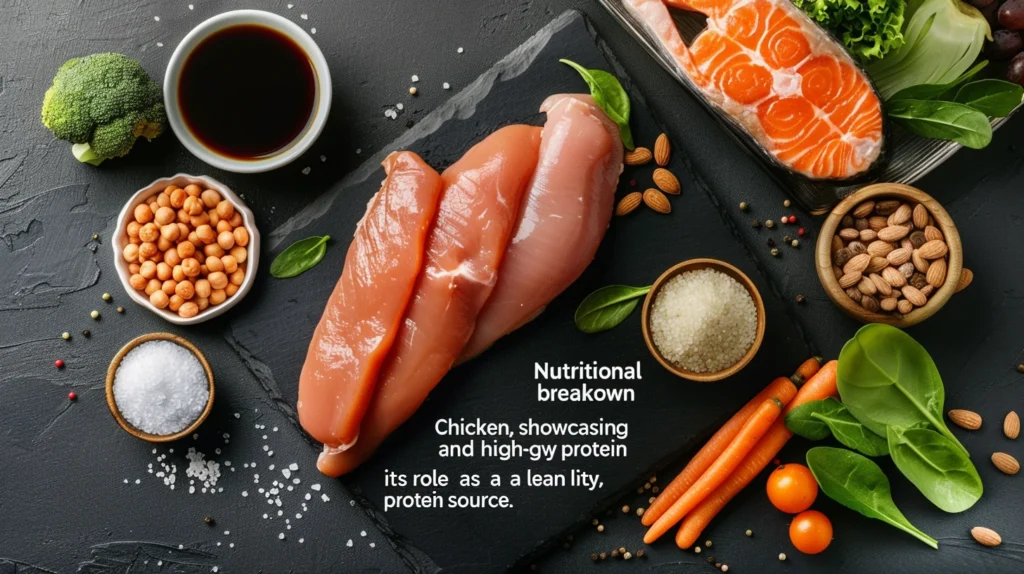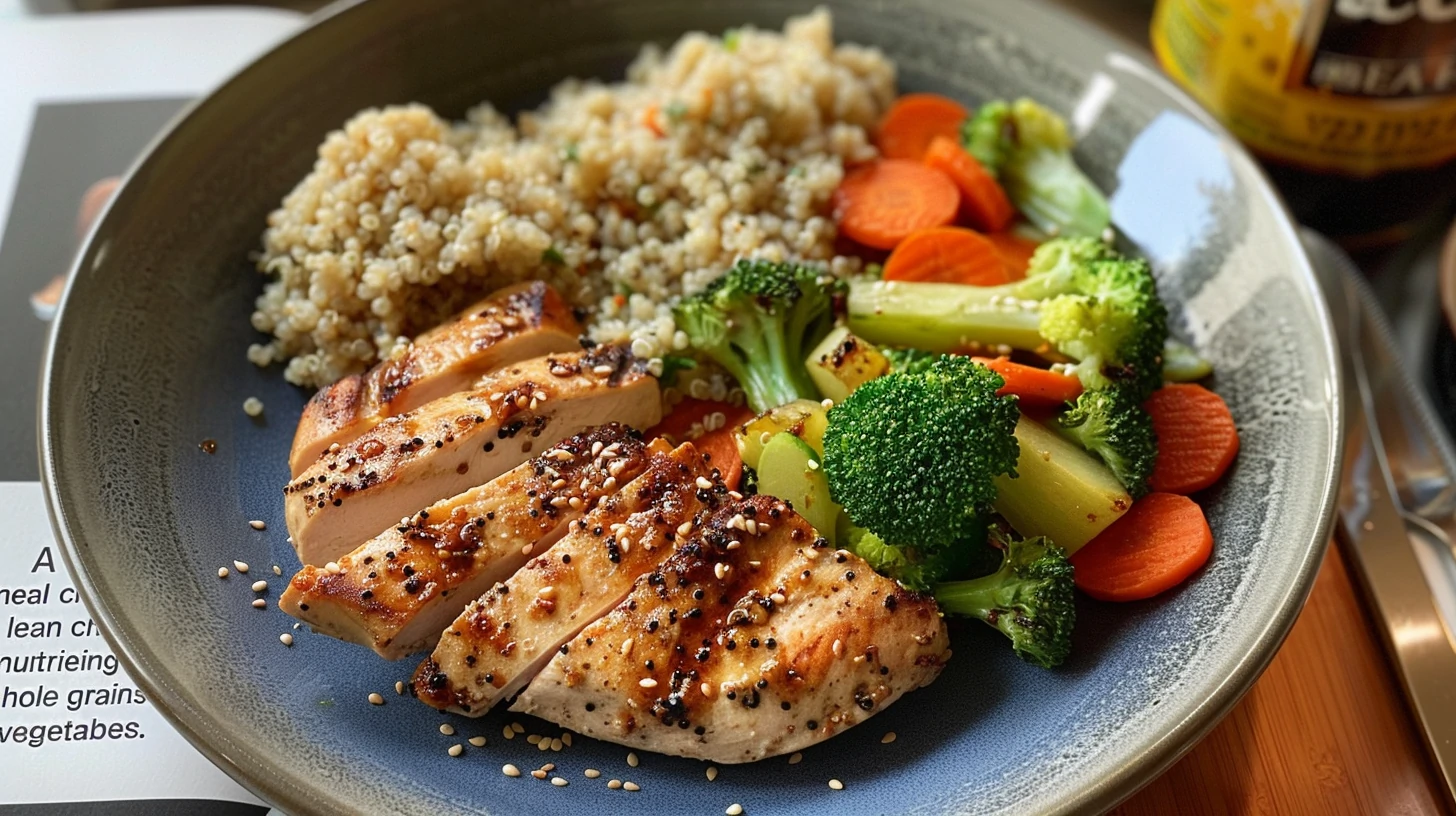Table of Contents
Polycystic Ovary Syndrome (PCOS) is a prevalent hormonal disorder affecting 5% to 10% of women of reproductive age globally. Many wonder, should I avoid chicken in PCOS to better manage symptoms? This condition is associated with irregular menstrual cycles, excess androgen levels, and insulin resistance. These symptoms can lead to challenges in weight management and overall health, raising questions like, “Should I avoid chicken in PCOS?” Understanding the role of chicken in a PCOS-friendly diet is essential for making informed dietary choices.
Dietary habits play an essential part in managing PCOS symptoms. Women with PCOS often ask, “Should I avoid chicken in PCOS?” as they focus on foods that stabilize blood sugar levels, reduce inflammation, and support hormonal balance. Chicken a widely consumed protein source has sparked debate in this context. Some argue that non-organic varieties may worsen PCOS symptoms due to potential hormone content, leading to questions like “Should I avoid chicken in PCOS?” Others emphasize its role as a lean, high-quality protein that fits nicely into a PCOS-friendly diet.
This article explores the role of chicken in a PCOS-friendly diet. We’ll delve into its nutritional benefits, address concerns about its consumption, and offer evidence-based recommendations to help you make informed dietary choices.
What is PCOS? Should I Avoid Chicken in PCOS?
Defining PCOS and Its Impact
Polycystic Ovary Syndrome (PCOS) is a hormonal disorder characterized by a combination of symptoms stemming from an imbalance of reproductive hormones. It affects ovarian function, leading to irregular menstrual cycles, difficulty in ovulation, and the formation of tiny cysts on the ovaries.
Women suffering from PCOS are often afflicted with a variety of symptoms. These include:
- Irregular or missed periods.
- Excess androgen levels result in acne, hirsutism (excess facial or body hair), and hair thinning.
- Insulin resistance, which can lead to weight gain or difficulty losing weight.
- Increased risk of long-term health issues such as Type 2 diabetes, heart disease, and infertility.
The severity of PCOS symptoms varies widely, and its exact causes are not fully understood. However, other factors like lifestyle, genetics, and environmental influences are thought to play a significant role.
Why Diet Matters in PCOS
Diet plays a crucial part in the management of PCOS symptoms. Since insulin resistance is a key factor in PCOS, choosing foods that promote stable blood sugar levels is essential. Additionally, inflammation often accompanies PCOS, making anti-inflammatory dietary choices vital.
A PCOS-friendly diet emphasizes:
- High-quality protein sources: To maintain satiety and muscle mass.
- Low-glycemic index (GI) carbohydrates: To prevent blood sugar spikes.
- Healthy fats: To support hormonal function.
- Fibre-rich foods: To aid digestion and manage weight.
The choice of protein, including chicken, becomes a significant consideration because it directly impacts how well the body manages blood sugar and inflammation. While some women with PCOS avoid chicken due to concerns about added hormones in non-organic options, others rely on its lean protein content to help manage symptoms effectively.
The Nutritional Profile of Chicken: Should I Avoid Chicken in PCOS?

Nutritional Benefits of Chicken
Chicken is a widely consumed source of lean protein that provides essential nutrients beneficial for overall health. For women managing PCOS, its nutrient composition can be particularly advantageous:
- High-Quality Protein: Chicken contains all nine essential amino acids, making it a complete protein. Protein helps stabilize blood sugar levels, reduce cravings, and promote muscle repair and growth.
- Vitamins and Minerals: Chicken is rich in B vitamins, particularly B6 and niacin, which play a role in energy metabolism and neurological function. It also contains selenium, phosphorus, and zinc, supporting immune health and bone strength.
- Low-Fat Content: When prepared without added fats, chicken is naturally low in saturated fat, making it a heart-healthy option.
Role of Protein in Managing PCOS Symptoms
For women with PCOS, maintaining stable blood sugar levels is critical. This often leads to the question, “Should I avoid chicken in PCOS?” High-protein foods like chicken play a vital role by slowing down the absorption of carbohydrates and preventing sharp glucose spikes. Including chicken in a balanced diet can help manage insulin resistance, a common symptom of PCOS, further addressing concerns about whether chicken should be avoided in PCOS.
Additionally, protein supports weight management, a crucial aspect of PCOS management. Consuming protein-rich foods enhances feelings of fullness and reduces overall calorie intake, aiding in weight control.
Comparing Chicken With Other Protein Sources
While chicken offers many benefits, it is essential to compare it with other protein sources to determine its suitability in a PCOS diet:
- Plant-Based Proteins: Options like lentils, beans, and tofu are excellent for individuals who prefer vegetarian diets. However, these sources may lack certain essential amino acids and often contain more carbohydrates.
- Fish: Salmon, mackerel, and tuna are rich in omega-3 fatty acids, which are anti-inflammatory and beneficial for PCOS.
- Other Meats: Lean cuts of beef or turkey are good alternatives, but their fat content and preparation methods must be considered.
Chicken is a versatile, nutrient-dense, and accessible option, making it a staple in many PCOS-friendly meal plans. However, choosing the right type of chicken and preparation methods is crucial to maximize its health benefits.
Concerns About Chicken in PCOS: Should I Avoid Chicken in PCOS?
Potential Hormone Content in Chicken
One of the primary concerns surrounding chicken consumption in PCOS diets is the potential presence of added hormones. Some non-organic poultry farms use growth-promoting substances to enhance production. These hormones may mimic estrogen in the body, potentially disrupting hormonal balance for women with PCOS.
However, it’s important to note:
- Regulations on Hormones: Many countries, including the United States, prohibit using hormones in poultry production. The concerns about hormone content often stem from misconceptions or practices that are not globally consistent.
- Scientific Evidence: Studies indicate that the hormone levels in chicken are minimal and unlikely to affect human health significantly.
Processed vs. Organic Chicken
The type of chicken you choose can significantly impact its health benefits:
- Processed Chicken: Products like chicken nuggets, deli meats, and frozen tenders are often high in sodium, unhealthy fats, and preservatives. These additives can exacerbate inflammation and insulin resistance in PCOS.
- Organic Chicken: Organic and free-range chicken are typically raised without antibiotics or synthetic hormones. Choosing these options can reduce exposure to potential contaminants and align better with a PCOS-friendly diet.
Common Misconceptions About Chicken and PCOS
Several myths about chicken consumption and PCOS persist, often causing unnecessary dietary restrictions:
- “Chicken Causes Hormonal Imbalance”: While some worry about hormones in chicken, these fears are primarily unsubstantiated due to strict regulations in many regions.
- “Chicken Leads to Weight Gain”: Weight gain is more influenced by portion sizes and preparation methods than by chicken itself.
- “Plant-Based Proteins Are Superior for PCOS”: While plant-based proteins are excellent, they cannot entirely replace the complete amino acid profile and bioavailability of lean animal proteins like chicken.
Addressing these misconceptions helps clarify chicken’s role as a viable protein source for women with PCOS when consumed mindfully and in moderation.
Benefits of Including Chicken in a PCOS Diet: Should I Avoid Chicken in PCOS?
How Chicken Supports Weight Management
Weight management is a critical aspect of PCOS care, as even a modest reduction in weight can significantly improve symptoms. Chicken, being low in calories and high in protein, plays a supportive role:
- Enhancing Satiety: Protein takes longer to digest compared to carbohydrates, which can help reduce hunger and overall calorie intake.
- Preserving Lean Muscle Mass: Maintaining muscle is essential to prevent metabolic slowdown during weight loss. Chicken provides the amino acids needed for muscle repair and retention.
Incorporating chicken into balanced meals ensures satiety and aids in sustainable weight control, which is essential for managing PCOS symptoms like insulin resistance.
Chicken as a Source of Low-Fat, High-Quality Protein
Chicken is naturally low in fat, especially when choosing lean cuts like breast meat. This makes it a preferred option for reducing excess dietary fats that may contribute to inflammation a known issue in PCOS.
Key benefits of chicken protein include:
- Blood Sugar Regulation: High-protein foods like chicken help balance glucose levels, reducing the risk of blood sugar spikes and crashes.
- Hormonal Support: Adequate protein intake supports the production of hormones that regulate appetite, stress, and metabolism.
Importance of Portion Control and Preparation Methods
While chicken offers numerous health benefits, portion control and preparation methods are crucial:
- Portion Sizes: Consuming 3–4 ounces of chicken per meal is sufficient for most women with PCOS, providing about 25–30 grams of protein.
- Healthy Cooking Techniques: Opt for grilling, baking, or steaming instead of frying to minimize added fats and calories. Avoid sauces and breading high in sugar and refined carbohydrates.
Combating Inflammation with Chicken
Specific cuts of chicken, like skinless breast meat, are less inflammatory than processed or fried chicken. Pairing chicken with anti-inflammatory foods such as leafy greens, whole grains, and healthy fats can enhance its benefits for women with PCOS.
Alternatives to Chicken for PCOS-Friendly Diets
Plant-Based Protein Options
For women with PCOS who prefer to limit or avoid animal protein, plant-based options can provide excellent alternatives. While they may lack some essential amino acids present in chicken, combining different plant proteins can ensure a complete nutrient profile. Key plant-based proteins include:
- Legumes: Lentils, chickpeas, and black beans are high in protein and fibre, promoting satiety and blood sugar stability.
- Tofu and Tempeh: Made from soy, these options are rich in protein and contain phytoestrogens, which may help balance hormones in some women with PCOS.
- Nuts and Seeds: Almonds, chia seeds, and flaxseeds are nutrient-dense but should be consumed in moderation due to their higher fat content.
Fish and Seafood as Alternatives
Fish and seafood provide high-quality protein and omega-3 fatty acids known for their anti-inflammatory properties.
- Salmon: Salmon is a fatty fish rich in omega-3s, which supports heart health and helps combat inflammation associated with PCOS.
- Tuna and Sardines: Low-calorie options that pack a protein punch.
- Shrimp and Scallops: Lean seafood choices with minimal fat and ample protein.
Egg Whites and Other Lean Meats
Egg whites are an excellent low-calorie protein option for women managing PCOS. They can be incorporated into meals or snacks for a quick and easy protein boost. Other lean meats like turkey or trimmed pork tenderloin can provide variety in a protein-rich diet.
Balancing Protein Sources for Optimal Nutrition
To ensure a well-rounded diet, combining different protein sources is ideal. This approach provides a diverse array of vitamins, minerals, and amino acids that benefit overall health and aid in managing PCOS.
- Rotate between chicken, plant-based proteins, and fish throughout the week.
- Incorporate protein into each meal to maintain blood sugar stability and support muscle maintenance.
Choosing alternatives to chicken can add variety and meet individual dietary preferences while supporting the nutritional needs of women with PCOS.
Tips for Choosing and Preparing Chicken for PCOS
Opting for Hormone-Free, Organic Chicken

When selecting chicken for a PCOS-friendly diet, the source and quality of the poultry are essential considerations:
- Organic Chicken: Certified organic chicken is raised without antibiotics, synthetic hormones, or genetically modified feed, reducing the risk of exposure to harmful substances.
- Free-Range Options: Chickens allowed to roam freely may have better nutrient profiles than factory-farmed poultry.
- Local or Farm-Fresh Poultry: Local farms are fresher and often align with healthier and more sustainable farming practices.
Choosing hormone-free and organic chicken can alleviate concerns about artificial hormones exacerbating PCOS symptoms.
Healthy Cooking Methods for Chicken
The way chicken is prepared significantly affects its impact on health. Women with PCOS should focus on methods that retain the meat’s nutritional value while minimizing unhealthy additives. Recommended cooking methods include:
- Grilling or Broiling: These techniques enhance flavour without adding unnecessary fats or calories.
- Baking or Roasting: Allows for even cooking and keeps the chicken moist without requiring excessive oils.
- Steaming or Poaching: Preserves the lean quality of chicken and pairs well with nutrient-rich vegetables.
Avoiding Unhealthy Preparations
Specific cooking methods can negate the health benefits of chicken, particularly for women managing PCOS:
- Fried Chicken: High in unhealthy fats and calories, fried chicken can contribute to inflammation and insulin resistance.
- Processed Chicken Products: Deli meats, nuggets, and other processed options are often loaded with sodium, preservatives, and unhealthy additives.
- Sugary Sauces or Marinades: These can spike blood sugar levels, which is counterproductive for managing PCOS.
Pairing Chicken with PCOS-Friendly Foods
For maximum benefits, combine chicken with foods that complement its nutritional value and support PCOS management:
- Whole Grains: Brown rice, quinoa, and barley stabilize blood sugar levels.
- Leafy Greens: Spinach, kale, and arugula are rich in fibre and antioxidants.
- Healthy Fats: Avocado, olive oil, and nuts improve hormonal health.
Creating balanced meals with chicken and PCOS-friendly ingredients ensures a diverse, nutrient-rich diet that promotes overall wellness.
Frequently Asked Questions (FAQ):
Is organic chicken better for PCOS?
Yes, organic chicken is better as it is free from synthetic hormones and antibiotics, reducing potential risks of hormone disruption.
Can chicken affect hormone levels?
Not significantly when consumed in moderation. Opting for hormone-free or organic chicken minimizes any potential impact.
What is the best way to prepare chicken for a PCOS diet?
Grill, bake, steam, or poach chicken to retain its lean quality. Pair it with fibre-rich vegetables and whole grains for added benefits.
How much chicken can I eat if I have PCOS?
A portion size of 3–4 ounces per meal is ideal, providing about 25–30 grams of protein to support blood sugar control and satiety.
Should I avoid chicken entirely if I have severe PCOS?
No, there’s no need to avoid chicken entirely. Choosing organic and avoiding processed options makes it a safe and beneficial choice.
What other animal proteins are good for PCOS?
Fish (e.g., salmon), eggs, turkey, and low-fat dairy are excellent alternatives that support PCOS management.
Conclusion
Chicken can be beneficial in a PCOS diet when chosen and prepared thoughtfully. As a lean, high-quality protein, it supports weight management, blood sugar stability, and muscle maintenance all crucial factors for managing PCOS symptoms. Concerns about hormones in chicken can be mitigated by selecting organic or hormone-free options or opting for grilled Chick-fil-A nuggets as a healthier fast-food choice.
Balancing chicken with other protein sources and nutrient-dense foods ensures a varied and healthful diet. Whether you prefer chicken or alternative proteins, the key lies in moderation, portion control, and healthy preparation methods.
Finally, consulting with a healthcare professional or dietitian is essential to personalize your diet for PCOS management. Individual needs and preferences can vary, and expert guidance can ensure that your dietary choices align with your health goals.
